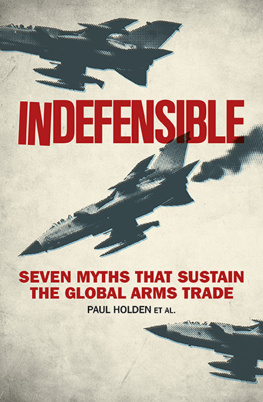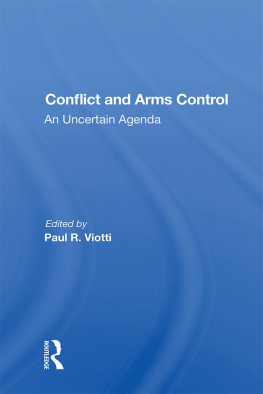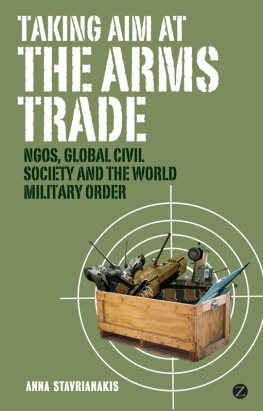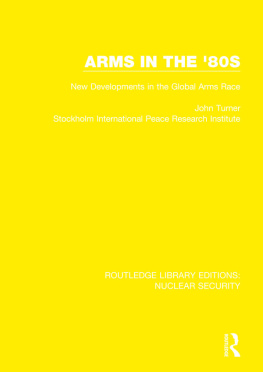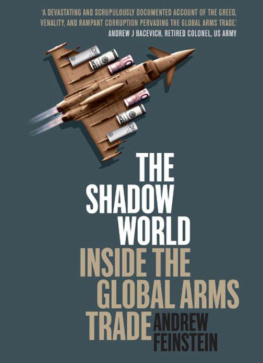
ABOUT THE AUTHOR
Paul Holden is a historian and researcher. His previous books include Who Rules South Africa? (2012), The Devil in the Detail: How the Arms Deal Changed Everything (2011) and The Arms Deal in Your Pocket (2008). He was also lead researcher on Andrew Feinsteins book The Shadow World (2012) and on the documentary feature of the same name released in 2016. He currently works as Director of Investigations at Corruption Watch UK.
Learn more about associated research, educational and activism projects at projectindefensible.org.
INDEFENSIBLE
SEVEN MYTHS THAT SUSTAIN THE GLOBAL ARMS TRADE
PAUL HOLDEN
WITH
Bridget Conley-Zilkic, Alex de Waal, Sarah Detzner, John Paul Dunne, Andrew Feinstein, William Hartung, Paul Holtom, Lora Lumpe, Nic Marsh, Sam Perlo-Freeman, Hennie Van Vuuren, Leah Wawro

Zed Books
LONDON
Indefensible: Seven Myths that Sustain the Global Arms Trade was first published in 2016 by Zed Books Ltd, The Foundry, 17 Oval Way, London SE11 5RR, UK
www.zedbooks.net
Copyright World Peace Foundation and Corruption Watch 2016
Copyright in this collection Zed Books 2016
The right of Paul Holden to be identified as the author of this work has been asserted by him in accordance with the Copyright, Designs and Patents Act, 1988
Typeset in Adobe Caslon Pro by seagulls.net
Index: John Barker
Cover design: Design Deluxe
All rights reserved. No part of this publication may be reproduced, stored in a retrieval system or transmitted in any form or by any means, electronic, mechanical, photocopying or otherwise, without the prior permission of Zed Books Ltd.
A catalogue record for this book is available from the British Library
ISBN 978-1-78360-566-8 hb
ISBN 978-1-78360-565-1 pb
ISBN 978-1-78360-570-5 pdf
ISBN 978-1-78360-567-5 epub
ISBN 978-1-78360-571-2 mobi
CONTENTS
FIGURES
ACRONYMS AND ABBREVIATIONS
BNL | Banca Nazionale del Lavoro |
CAAT | Campaign Against the Arms Trade |
CCL | Commercial Control List |
CERN | European Organization for Nuclear Research |
CIA | Central Intelligence Agency |
COTS | commercial-off-the-shelf |
CREW | Citizens for Responsibility and Ethics in Washington |
DARPA | Defense Advanced Research Projects Agency |
DIP | Defense Industrial Participation |
DoD | US Department of Defense |
DoJ | Department of Justice |
EU | European Union |
FBI | Federal Bureau of Investigation |
FCPA | Foreign Corrupt Practices Act |
GDP | gross domestic product |
GI | Government Defence Anti-Corruption Index |
ICBM | intercontinental ballistic missile |
ISIS | Islamic State of Iraq and Syria |
LCS | littoral combat ship |
MIT | Massachusetts Institute of Technology |
MOD | UK Ministry of Defence |
NATO | North Atlantic Treaty Organization |
NGOs | nongovernmental organizations |
NSA | National Security Agency |
NSDD | National Security Decision Directive |
OCO | Overseas Contingency Operations |
PDB | Presidents Daily Brief |
R&D | research and development |
RPG | rocket-propelled grenade |
RPF | Rwandan Patriotic Front |
SFO | UK Serious Fraud Office |
SIPRI | Stockholm International Peace Research Institute |
SPLM/A | Sudan Peoples Liberation Movement and Army |
UAE | United Arab Emirates |
UN | United Nations |
USAID | US Agency for International Development |
VVIP | Very Very Important Person |
INDEFENSIBLE: SETTING THE SCENE
Just before midday on 15 March 2008, an arms dump in the small Albanian village of Gerdec caught alight. The gargantuan explosions that followed were heard nearly a hundred miles away and continued for almost fourteen hours. The explosions killed twenty-six people, including a three-year-old, a seven-year-old who was cycling nearby and a pregnant woman. Over 300 people were injured, 318 houses completely destroyed and 400 others damaged.
It was a tragedy designed by the international arms business and involving the collusion of the US government, Albanian government and a contract with a shady company, AEY Inc.
The story begins in January 2007, when the US Department of Defense awarded a $298 million contract to an upstart US company, AEY, to supply ammunition to the Afghan military. The US-backed Afghan National Army uses Soviet-designed small arms such as Kalashnikovs, as they are accustomed to them, and they are cheap and serviceable. But (at that time), America didnt manufacture the ammunition for the ubiquitous AK47 assault rifle. So the DoD looked to buy what it needed from elsewhereand faced the immediate and obvious problem that its likely sources of supply were Chinese and former Eastern Bloc manufacturers. Circumventing such difficulties is the stock-in-trade of the arms business, and the DoD had a simple solution: to outsource the supply.
The contract was won by a company that few had heard of until that time. Thats not unusual in this business of corporate chameleons. AEY was run by twenty-one-year-old Efraim Diveroli, who not only carried a forged driving license but had previously been arrested for domestic violence. The companys vice-president was a former masseur. Serial party-goers and regular pot smokers, they also dabbled in cocaine and acid.
Both AEY and its youthful president had been placed on the State Departments Arms Trafficking Watch List, a list that was not consulted when the contract was awarded. The Pentagon commissioned an independent evaluation of the company that returned a glowing endorsement. The evaluation was written by an individual who was a financial backer and vice-president of AEY.
Diveroli operated at the thrift-store bargain-hunting end of the arms business supply chain. Seeking cheap ammunition, he turned to Albania. Until the fall of the Berlin Wall, Albania had been one of the most militarized countries in Europe, its former dictator Enver Hoxha building bunkers and situating arms caches across the territory of his small nation. The country had liberalized its economy, remained poor and didnt need all those old bullets. So Albanias defense authorities were in the process of dismantling and repacking its old ammunition stores to be recycled or disposed of. A shady firm (not AEY) led by a small-time US dealer and a politically connected Albanian businessman bought the ammunition and persuaded the defense minister, with the support of the prime minister, to have the army truck it for free to Gerdec, a small village near Albanias sole international airport. There, the ammunition was to be cleaned, sorted and repacked.
Next page
